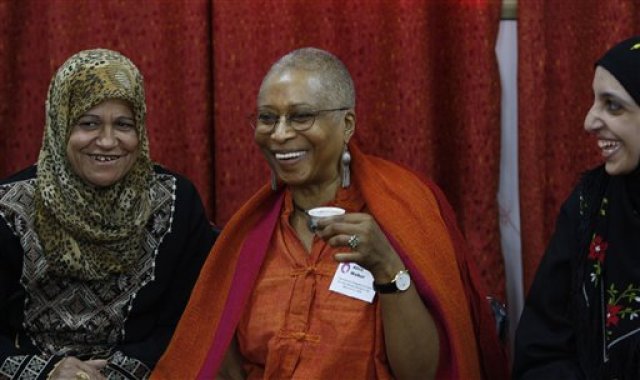
Celebrated US author and poet Alice Walker is among 38 people who will join Audacity of Hope, the ship sponsored by US Boat to Gaza as part of an international effort to break Israel’s maritime siege of Gaza.
Walker has authored more than thirty books, the best known of which is the Pulitzer Prize winning novel The Color Purple.
Speaking to ElectronicIntifada.net co-founder Ali Abunimah, Walker draws parallels between the Gaza Freedom Flotilla and the Freedom Rides during the US civil rights movement in 1961, when black and white people boarded interstate buses together to break the laws requiring racial segregation.
The full interview can be read at www.electronicintifada.net .
* * *
You’ve made the connection with the Freedom Rides that happened 50 years ago. Can you talk about that?
Yes, it means that the baton is being passed on to us of journeying to places in the world where people need us and where our governments are not helpful and in fact are destructive.
Just before my first year of college, the Freedom Riders came down to the south. I was living in Georgia under intense segregation that white supremacists and many black people assumed would last forever.
They had become extremely complacent after 100 years of brutality and subjugation of black people; and so when the Freedom Riders came down we didn’t expect them to survive.
But we were very grateful because at least it assured us that someone outside of our own community objected to the repression that we endured every day and it meant a lot to us. It lifted our spirits, it gave us courage, it gave us hope.
The government has never said “Oh yes, go out and protest.” It has always said, “we will not support you and you shouldn’t do it and it’s wrong and it’s bad and it’s not good for you.”
But really that’s why you protest.
In recent weeks we’ve seen a number of protests take place of Palestinian refugees marching to the Israeli-controlled frontiers of Palestine and being shot at by Israel. The Israelis have said that they are making preparations to stop the flotilla. What do you think needs to happen? How can we raise awareness in a way that we can mobilise that kind of support for this flotilla and its goal of lifting the blockade?
The facts are that we are dealing with some very brutal people; people indoctrinated over a long period of time. And a military that obviously is insensitive to the sufferings of other people. That’s the reality.
So it would be great if media outlets run by people of conscience raised the hue and cry.
And that is why I am steeping myself in the words of the people before me who have been in the same position and who have decided: “Well I love this world ... I love these little children.
“They don’t deserve this. They don’t deserve to be abused; they don’t deserve to be frightened.
“I’m an adult. I’m an elder. So, how can I let this happen to them without some kind of resistance?”
You were previously in Gaza and you wrote an incredibly beautiful short book about it, Overcoming Speechlessness. And you recently were in the West Bank. What was your experience?
Well, the wall [built by Israel that cuts across Palestinian land]. When I was looking at a snippet of the [US] Congress — people applauding [Israeli Prime Minister Benjamin] Netanyahu — I just had to wonder if they had ever stood in the shadow of that wall.
That wall is such an insult to the soul of humanity. It’s so enormous and threatening. And they are building it right in the faces of people and stealing their land in the process. So not only are they walling in the people but they are taking their land and then shooting at them when they try to work their land so they can have something to eat.
This is such a crime against the soul of humanity. We can’t stand this. Who are we as human beings if we can even bear this? We cannot bear it. And we must not.
And then the other thing was the [illegal Israeli] settlements are huge. They are unlike anything I had expected. And they are everywhere!
And so I realised that this whole long drama, the charade called the peace process, was simply a diversion, a shadow play, so that people wouldn’t realise that there was never going to be any peace.
It was always about taking the land. Religion had nothing to do with it, or it was used as an excuse.
Comments
Anonymous replied on Permalink
Anonymous replied on Permalink
Anonymous replied on Permalink
Anonymous replied on Permalink
Anonymous replied on Permalink
Anonymous replied on Permalink
Anonymous replied on Permalink